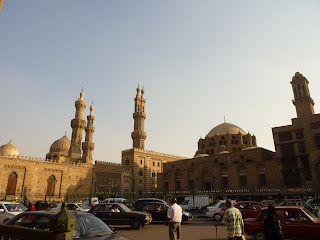Unlike on the way here, I don’t change shoes on the plane, I put on the far too warm sneakers right away in order to save room in my backpack. And I have the hooded sweatshirt and a jacket in my hand, haven’t worn it for two months though some air-conditioning had me longing for a sweater. Now I know it’s not mainly about the plane’s AC.
The hours before leaving are always a bit strange. I meet Ahmed for breakfast and then there is the in-between-hour. My host mother prepared a last Egyptian breakfast for me, all my bags are packed. I wake up my younger host sister to say goodbye. I am a little stressed out about my flights, so I don’t really have time to be sad right now. I take a taxi to the airport and am quite glad to completely manage this in Arabic without much effort. There are nearly three hours left until I am going to leave – and I am very lucky to be this early because I learn my flight has been cancelled. There are only three ladies working in the Lufthansa office, so I have to wait for one hour although I am the fifth person queuing for rebooking. Luckily I get on a SwissAir flight which will take me to Hamburg via Zurich less than one hour later than my original flight. While waiting at the gate I have an insightful conversation with a Swiss lady who has been living in Egypt for some 30 years and is married to an Egyptian. It is always interesting to talk to Europeans who have become outsiders towards Europe, but once again I feel that I could not imagine living like this. This time I did not forget my camera, but due to the rebooking I have a seat in the very middle of the 747, of course. This gives me time to successfully memorize the amino acids.
Although I did not have much of a classical vacation I feel very rearranged. I learned quite some Arabic, found my way around Cairo, saw a different health care system close up from the medical professional's perspective for the first time in my life and learned a lot about myself, especially by this second experience of really living abroad ten years after my exchange year.
My world has become smaller again in terms of both cultural and geographic distances: I will always feel kind of at home in Cairo and I have people to think of when places as distant as Madagascar, New Zealand or Tennessee are mentioned.
And my world has become bigger in the number of great people that I am fortunate to have in it.
Going back on the first Sunday of October, Thanksgiving in Germany, I have incredibly much to be grateful for.








